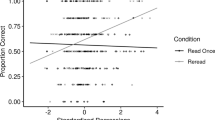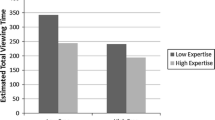Abstract
Previewing answer-choice options before finishing reading the text is a widely employed test-taking behavior. In the present study we examined whether previewing is related to item response accuracy and response time, using data from Chinese learners of varying English proficiency levels and English native speakers. We examined eye movement patterns of participants who completed online multiple-choice sentence completion tasks, and how previewing was related to reading performance and whether the relation varied as a function of English proficiency level. The results showed that, relative to no previewing, previewing was associated with a significantly lower probability of answering an item correctly but not with significantly longer response time. Importantly, these relations varied across English proficiency levels such that participants with higher proficiency performed better without previewing, but there was no difference for lower-intermediate learners of English. These findings suggest that previewing does not facilitate performance on a sentence comprehension task, but instead interferes with the comprehension process, particularly for individuals with relatively high language proficiency.


Similar content being viewed by others
References
Bachman, L. F. (1982). The trait structure of cloze test scores. TESOL Quarterly, 16, 61–70.
Bax, S. (2013). The cognitive processing of candidates during reading tests: Evidence from eye-tracking. Language Testing, 30, 441–465.
Benjamini, Y., & Hochberg, Y. (1995). Controlling the false recovery rate; a practical and powerful approach to multiple testing. Journal of the Royal Statistical Society: Series B, 57, 289–300.
Bernhardt, E. B., & Kamil, M. L. (1995). Interpreting relationships between L1 and L2 reading: Consolidating the linguistic threshold and the linguistic interdependence hypotheses. Applied Linguistics, 16, 15–31.
Cain, K. (2007). Syntactic awareness and reading ability: Is there any evidence for a special relationship? Applied Psycholinguistics, 28, 679–694.
Cain, K., Oakhill, J., & Bryant, P. (2004). Children’s reading comprehension ability: Concurrent prediction by working memory, verbal ability, and component skills. Journal of Educational Psychology, 96, 31–42.
Cohen, A. D. (2006). The coming of age of research on test-taking strategies. Language Assessment Quarterly, 3, 307–331.
Cohen, A. D. (2011). Strategies in learning and using a second language (2nd ed.). Harlow: Longman Applied Linguistics/Pearson Education.
Cohen, A. D., & Upton, T. A. (2007). ‘I want to go back to the text’: Response strategies on the reading subset of the new TOEFL. Language Testing, 24, 209–250.
Graesser, A. C., Singer, M., & Trabasso, T. (1994). Constructing inferences during narrative text comprehension. Psychological Review, 101(3), 371–395.
He, T. (2008). Reading for different goals: The interplay of EFL college students’ multiple goals, reading strategy use and reading comprehension. Journal of Research in Reading, 31, 224–242.
Hoover, W. A., & Gough, P. B. (1990). The simple view of reading. Reading and Writing: An Interdisciplinary Journal, 2, 127–160. doi:10.1007/BF00401799.
Hosenfeld, C. (1977). A preliminary investigation of the reading strategies of successful and unsuccessful second language learners. System, 5, 110–123.
Jenkins, J. R., Fuchs, L. S., van den Broek, P., Espin, C., & Deno, S. L. (2003). Sources of individual differences in reading comprehension and reading fluency. Journal of Educational Psychology, 95, 719–729.
Jeon, E. H., & Yamashita, J. (2014). L2 reading comprehension and its correlates: A meta-analysis. Language Learning, 64, 160–212.
Jonz, J. (1990). Another turn in the conversation: What does cloze measure? TESOL Quarterly, 24, 61–83.
Kendeou, P., van den Broek, P., White, M. J., & Lynch, J. S. (2009). Predicting reading comprehension in early elementary school: The independent contributions of oral language and decoding skills. Journal of Educational Psychology, 101, 765–778.
Kieffer, M. J., Vukovic, R. K., & Berry, D. (2013). Roles of attention shifting and inhibitory control in fourth-grade reading comprehension. Reading Research Quarterly, 48, 333–348.
Kim, Y.-S. (2015a). Language and cognitive predictors of text comprehension: Evidence from multivariate analysis. Child Development, 86, 128–144.
Kim, Y.-S. G. (2015b). Developmental, component-based model of reading fluency: An investigation of word reading fluency, text reading fluency, and reading comprehension. Reading Research Quarterly, 50, 459–481.
Kim, Y.-S. G. (2016). Direct and mediated effects of language and cognitive skills on comprehension or oral narrative texts (listening comprehension) for children. Journal of Experimental Child Psychology, 141, 101–120.
Kim, Y.-S., Park, C., & Wagner, R. K. (2014). Is oral/text reading fluency a “bridge” to reading comprehension? Reading and Writing: An Interdisciplinary Journal, 27, 79–99.
Kim, Y.-S., & Wagner, R. K. (2015). Text (Oral) reading fluency as a construct in reading development: An investigation of its mediating role for children from Grades 1 to 4. Scientific Studies of Reading, 19, 224–242.
Kim, Y.-S., Wagner, R. K., & Lopez, D. (2012). Developmental relations between reading fluency and reading comprehension: A longitudinal study from grade 1 to grade 2. Journal of Experimental Child Psychology, 113, 93–111.
Kintsch, W. (1988). The use of knowledge in discourse processing: A construction-integration model. Psychological Review, 95, 163–182.
Kintsch, W. (1994). Text comprehension, memory, and learning. American Psychologist, 49, 294–303.
Kintsch, W., & Van Dijk, T. A. (1978). Toward a model of text comprehension and production. Psychological Review, 85, 363–394.
Kuhn, M. R., & Stahl, S. A. (2003). Fluency: A review of developmental and remedial practices. Journal of Educational Psychology, 95, 3–21.
LaBerge, D., & Samuels, S. J. (1974). Toward a theory of automatic information processing in reading. Cognitive Psychology, 62, 293–323.
Lai, M. L., Tsai, M. J., Yang, F. Y., Hsu, C. Y., Liu, T. C., Lee, S. W. L., & Tsai, C. C. (2013). A review of using eye-tracking technology in exploring learning from 2000 to 2012. Educational Research Review, 10, 90–115.
Liontas, J. (2002). Transactional idiom analysis: Theory and practice. Journal of Language and Linguistics, 1, 17–52.
Markman, P. L. (1985). Rational deletion cloze and global comprehension in German. Language Learning, 35, 423–430.
McKenna, M. C., & Layton, K. (1990). Concurrent validity of cloze as a measure of intersentential comprehension. Journal of Educational Psychology, 82, 372–377.
Nation, K. (2005). Children’s reading comprehension difficulties. In M. J. Snowling and C. Hulme (Eds.), The science of reading: A handbook (pp. 248–265). Oxford: Blackwell Publishing.
Perfetti, C. A. (1994). Psycholinguistics and reading ability. In M. A. Gernsbacher (Ed.), Handbook of psycholinguistics (pp. 849–894). San Diego, CA: Academic.
Perfetti, C. A., Landi, N., & Oakhill, J. (2005). The acquisition of reading comprehension skill. In M. J. Snowling & C. Hulme (Eds.), The science of reading: A handbook (pp. 227–247). Oxford: Blackwell.
Perfetti, C. A., & Stafura, J. (2014). Word knowledge in a theory of reading comprehension. Scientific Studies of Reading, 18, 22–37.
Posner, M. I., & Snyder, C. R. R. (1975). Attention and cognitive control. In R. L. Solo (Ed.), Information processing and cognition: The Loyola symposium (pp. 55–85). Hillsdale, NJ: Erlbaum.
Proctor, C. P., Carlo, M., August, D., & Snow, C. (2005). Native Spanish-speaking children reading in English: Toward a model of comprehension. Journal of Educational Psychology, 97, 246–256.
Radach, R., Huestegge, L., & Reilly, R. (2008). The role of global top-down factors in local eye-movement control in reading. Psychological Research, 72, 675–688. doi:10.1007/s00426-008-0173-3.
RAND Reading Study Group. (2002). Reading for understanding: Toward an R&D program in reading comprehension. Santa Monica, CA: RAND.
Rayner, K. (2009). Eye movements and attention in reading, scene perception, and visual search. Quarterly Journal of Experimental Psychology, 62, 1457–1506. doi:10.1080/17470210902816461.
Sarig, G. (1987). High-level reading in the first and in the foreign language: Some comparative process data. In J. Devine, P. Carrell, & D. Eskey (Eds.), Research in reading in English as a second language (pp. 105–120). Washington, DC: Teachers of English to Speakers of Other Languages.
Shanahan, T., Kamil, M. L., & Tobin, A. W. (1982). Cloze as a measure of intersentential comprehension. Reading Research Quarterly, 17, 229–255.
Sherman, J. (1997). The effect of question preview in listening comprehension tests. Language Testing, 14, 185–213.
Sparks, R., Patton, J., Ganschow, L., & Humbach, N. (2012). Do L1 reading achievement and L1 print exposure contribute to the prediction of L2 proficiency? Language Learning, 62, 473–505.
Storey, P. (1997). Examining the test-taking process: A cognitive perspective on the discourse cloze test. Language Testing, 14, 214–231.
Tilstra, J., McMaster, K., van den Broek, P., & Rapp, D. (2009). Simple but complex: Components of the simple view of reading across grade levels. Journal of Research in Reading, 32, 383–401.
Uchikoshi, Y. (2013). Predictors of English reading comprehension: Cantonese-speaking English language learners in the US. Reading and Writing: An Interdisciplinary Journal, 26, 913–939.
van den Broek, P., Rapp, D. N., & Kendeou, P. (2005). Integrating memory-based and constructionist processes in accounts of reading comprehension. Discourse Processes, 39, 299–316.
Vellutino, F. R., Tunmer, W. E., Jaccard, J. J., & Chen, R. (2007). Components of reading ability: Multivariate evidence for a convergent skills model of reading development. Scientific Studies of Reading, 11, 3–32.
Verhoeven, L., & van Leeuwe, J. (2012). The simple view of second language reading throughout the primary grades. Reading and Writing: An Interdisciplinary Journal, 25, 1805–1818.
Vorstius, C., Radach, R., Mayer, M. B., & Lonigan, C. J. (2013). Monitoring local comprehension monitoring in sentence reading. School Psychology Review, 42(2), 191–206.
Walter, C. (2004). Transfer to reading comprehension skills to L2 is linked to mental representations of text and to L2 working memory. Applied Linguistics, 25, 315–339.
Yamashita, J. & Shiotstu, T. (2015). Comprehension and knowledge components that predict L2 reading: A latent-trait approach. Applied Linguistics. doi:10.1093/applin/amu079.
Author information
Authors and Affiliations
Corresponding author
Rights and permissions
About this article
Cite this article
Guo, Q., Kim, YS.G., Yang, L. et al. Does previewing answer choice options improve performance on reading tests?. Read Writ 29, 745–760 (2016). https://doi.org/10.1007/s11145-016-9626-z
Published:
Issue Date:
DOI: https://doi.org/10.1007/s11145-016-9626-z




